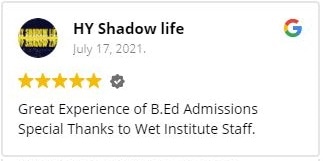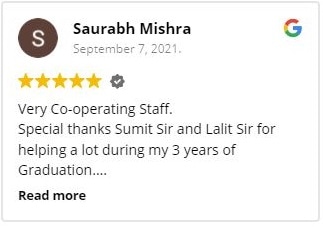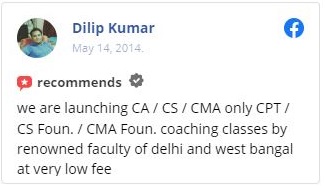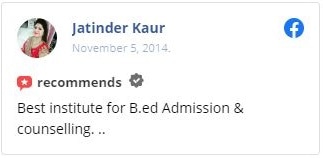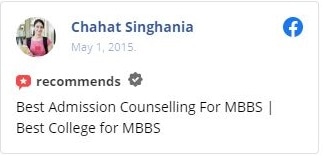BAMS (Bachelor of Ayurvedic Medicine and Surgery) Admission from Top Universities: Eligibility Criteria, Syllabus, Scope, and Career Opportunities.
BAMS Admission: Overview
Introduction Bachelor of Ayurvedic Medicine and Surgery (BAMS) is a popular undergraduate degree that integrates traditional Ayurvedic practices with modern medical knowledge. This program prepares students to become Ayurvedic doctors, capable of diagnosing and treating various health conditions through holistic approaches.
Key Highlights
Course Duration:
- The BAMS program typically lasts 5.5 years, which includes 4.5 years of academic study followed by a 1-year internship.
- The BAMS program typically lasts 5.5 years, which includes 4.5 years of academic study followed by a 1-year internship.
Eligibility Criteria:
- Candidates generally need to have completed their higher secondary education (12th grade) with a focus on science subjects, especially Biology, Chemistry, and Physics.
- A minimum percentage requirement (usually around 50%) is often set for eligibility.
Entrance Exams:
- Admission is primarily based on performance in entrance examinations, which may include:
- NEET (National Eligibility cum Entrance Test) in India
- State-level entrance exams specific to BAMS programs
- Admission is primarily based on performance in entrance examinations, which may include:
Application Process:
- The application process typically involves filling out an online form, submitting required documents (such as academic transcripts and entrance exam scores), and paying application fees.
- The application process typically involves filling out an online form, submitting required documents (such as academic transcripts and entrance exam scores), and paying application fees.
Career Opportunities:
- Graduates can pursue various career paths, including:
- Practicing as Ayurvedic doctors in clinics or hospitals
- Engaging in research and teaching positions
- Working in health and wellness sectors or Ayurvedic product companies
- Graduates can pursue various career paths, including:
Recognition and Regulation:
- BAMS is recognized and regulated by bodies such as the Central Council of Indian Medicine (CCIM) in India, ensuring that the education and practice meet established standards.
BAMS: Eligibility Criteria
To be eligible for admission to the Bachelor of Ayurvedic Medicine and Surgery (BAMS) program, candidates must meet certain academic and examination requirements. Here’s a detailed overview:
1. Educational Qualifications
- Higher Secondary Education: Candidates must have completed their 10+2 education (or equivalent) from a recognized board.
- Mandatory Subjects: The core subjects required are:
- Biology
- Chemistry
- Physics
2. Minimum Percentage
- Candidates typically need to secure a minimum percentage in their qualifying examination. This is often around 50% in the science subjects. For reserved category students, the cutoff may be lower (usually around 40-45%).
3. Entrance Exams
- Admission to BAMS programs is usually based on performance in specific entrance examinations. Common exams include:
- NEET (National Eligibility cum Entrance Test) in India
- State-level entrance exams or other country-specific tests.
4. Age Limit
- Many universities set an age limit for candidates, typically requiring students to be at least 17 years old on or before December 31 of the admission year. The upper age limit may vary by institution.
5. Medical Fitness
- Some institutions may require a medical fitness certificate to ensure candidates are physically fit for the demands of the program.
6. Documentation
- Academic transcripts from high school
- Entrance exam scores
- Proof of identity and nationality
- Additional documents as specified by the university.
BAMS Admission Process
The admission process for the Bachelor of Ayurvedic Medicine and Surgery (BAMS) program is structured and competitive. Here’s a detailed overview of the typical steps involved:
1. Research Programs
- Identify Institutions: Research various universities and colleges offering BAMS programs. Consider their reputation, faculty, course structure, and location.
2. Meet Eligibility Criteria
- Ensure that you meet the eligibility criteria, including educational qualifications, minimum percentage in required subjects, and entrance exam requirements.
3. Entrance Examination
- Register for Entrance Exams: Most candidates need to take specific entrance exams, such as:
- NEET (National Eligibility cum Entrance Test) in India
- Other state-level or country-specific exams.
- Preparation: Prepare thoroughly for these exams, as your scores will be critical for admission.
4. Complete the Application Form
- Online Application: Most universities have an online application portal. Fill out the application form with accurate information.
- Personal Information: Provide details such as academic records, contact information, and any required personal statements.
5. Submit Required Documents
- Academic transcripts from high school
- Entrance exam scores
- Medical fitness certificate (if required)
- Proof of identity and nationality
- Any additional documents specified by the institution.
6. Pay Application Fees
- Application Fee: Most universities charge a non-refundable application fee, typically ranging from $50 to $200. Ensure that you pay this fee to complete your application.
7. Acceptance and Enrollment
- Official Offer Letter: If accepted, you will receive an official offer letter. Follow the instructions provided to confirm your acceptance.
- Deposit Payment: You may need to pay a deposit to secure your place in the program.
BAMS: Fees and Duration
Duration of BAMS Program
The Bachelor of Ayurvedic Medicine and Surgery (BAMS) program typically lasts for 5.5 years, which includes:
Academic Studies:
- 4.5 Years: This phase focuses on theoretical and practical learning across various subjects related to Ayurveda, including:
- Basic Medical Sciences (Anatomy, Physiology, Biochemistry)
- Ayurvedic Principles and Practices
- Pharmacology
- Pathology
- Surgery and Gynecology
- 4.5 Years: This phase focuses on theoretical and practical learning across various subjects related to Ayurveda, including:
Internship:
- 1 Year: A mandatory internship where students gain hands-on clinical experience in hospitals and Ayurvedic clinics, applying their knowledge under supervision.
- 1 Year: A mandatory internship where students gain hands-on clinical experience in hospitals and Ayurvedic clinics, applying their knowledge under supervision.
Fees for BAMS Programs
The fees for BAMS programs can vary significantly depending on the institution, whether it is public or private, and the country. Here’s a general overview:
Tuition Fees:
- Public Universities: Tuition fees can range from $2,000 to $10,000 per year, making it more affordable.
- Private Universities: Fees at private institutions can be higher, typically ranging from $10,000 to $30,000 per year.
Additional Costs:
- Application Fees: Usually between $50 and $200, depending on the university.
- Books and Supplies: Estimated costs for books and materials can range from $500 to $1,500 annually.
- Living Expenses: Depending on the location, living costs (housing, food, transportation) can vary widely, often ranging from $5,000 to $15,000 per year.
Financial Aid and Scholarships:
- Many universities offer scholarships and financial aid options to assist students with tuition costs. It’s advisable to explore these opportunities and apply early.
BAMS: Syllabus
First Year
Anatomy
- Gross Anatomy
- Histology
- Embryology
Physiology
- Human Physiology
- Biochemistry
Fundamentals of Ayurveda
- Introduction to Ayurveda
- Basic Ayurvedic Concepts
Second Year
Pathology
- General Pathology
- Systemic Pathology
Pharmacology
- Pharmacognosy
- Ayurvedic Pharmacology (Dravyaguna)
Entomology and Microbiology
- General Microbiology
- Role of Microorganisms in Health
Third Year
Roga and Vikriti Vigyana
- Study of Diseases and Their Diagnosis
- Study of Diseases and Their Diagnosis
Ayurvedic Diagnostics
- Pulse Diagnosis
- Clinical Examination Techniques
Kaya Chikitsa (Internal Medicine)
- Treatment of Common Diseases
- Therapeutic Procedures
Fourth Year
Shalya Tantra (Surgery)
- Surgical Techniques in Ayurveda
- Sutures and Dressings
Shalakya Tantra (ENT, Ophthalmology, and Dentistry)
- Treatment of Ear, Nose, Throat Disorders
- Eye Diseases
Panchakarma
- Detoxification and Rejuvenation Techniques
- Therapeutic Procedures
Women’s Health (Stri Roga) and Child Health (Bal Roga)
- Special Topics in Gynecology and Pediatrics
- Special Topics in Gynecology and Pediatrics
Fifth Year
Advanced Kaya Chikitsa
- Specializations in Internal Medicine
- Management of Chronic Diseases
Research Methodology
- Introduction to Medical Research
- Study Design and Statistics
Internship (Clinical Training)
- Hands-on training in Ayurvedic hospitals and clinics, applying knowledge in real-world settings.
BAMS Admission: Scope and Career Opportunities
Scope of BAMS
The Bachelor of Ayurvedic Medicine and Surgery (BAMS) program offers a wide scope in the field of healthcare, blending traditional Ayurvedic practices with modern medical knowledge. The growing interest in holistic and alternative medicine has significantly expanded the opportunities for BAMS graduates. Here are some key areas of scope:
Clinical Practice:
- BAMS graduates can work as Ayurvedic doctors in clinics, hospitals, and wellness centers, providing consultations and treatments based on Ayurvedic principles.
- BAMS graduates can work as Ayurvedic doctors in clinics, hospitals, and wellness centers, providing consultations and treatments based on Ayurvedic principles.
Research and Academia:
- Opportunities exist in research organizations and educational institutions for those interested in teaching or conducting research in Ayurveda and integrative medicine.
- Opportunities exist in research organizations and educational institutions for those interested in teaching or conducting research in Ayurveda and integrative medicine.
Government Services:
- Many government health departments and organizations recruit BAMS graduates for roles in public health, community health programs, and rural healthcare initiatives.
- Many government health departments and organizations recruit BAMS graduates for roles in public health, community health programs, and rural healthcare initiatives.
Pharmaceutical and Herbal Industry:
- Graduates can work in the production, quality control, marketing, and research of Ayurvedic medicines and herbal products.
- Graduates can work in the production, quality control, marketing, and research of Ayurvedic medicines and herbal products.
Health and Wellness Sector:
- With an increasing focus on preventive health, BAMS graduates can find roles in wellness centers, spas, and holistic health clinics.
- With an increasing focus on preventive health, BAMS graduates can find roles in wellness centers, spas, and holistic health clinics.
Entrepreneurship:
- Many graduates choose to start their own practices or wellness centers, offering personalized Ayurvedic treatments and consultations.
- Many graduates choose to start their own practices or wellness centers, offering personalized Ayurvedic treatments and consultations.
Career Opportunities
Ayurvedic Practitioner:
- Providing consultations and treatment to patients in clinics or private practice.
- Providing consultations and treatment to patients in clinics or private practice.
Research Scientist:
- Engaging in research related to Ayurvedic medicine, herbal products, or integrative healthcare.
- Engaging in research related to Ayurvedic medicine, herbal products, or integrative healthcare.
Educator:
- Teaching positions in Ayurvedic colleges or universities, training future practitioners.
- Teaching positions in Ayurvedic colleges or universities, training future practitioners.
Healthcare Consultant:
- Advising organizations on the integration of Ayurvedic practices in healthcare settings.
- Advising organizations on the integration of Ayurvedic practices in healthcare settings.
Pharmaceutical Executive:
- Working in the development, marketing, and regulatory affairs of Ayurvedic medicines.
- Working in the development, marketing, and regulatory affairs of Ayurvedic medicines.
Public Health Officer:
- Involvement in government health programs focused on Ayurvedic practices and wellness initiatives.



